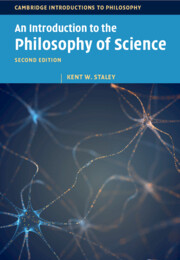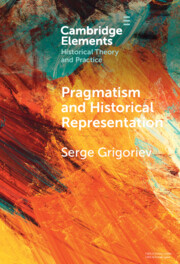Refine search
Actions for selected content:
81 results
3 - Political Tensions and the Democratic Press
- from Part II - Democracy and the Press Function
-
-
- Book:
- The Future of Press Freedom
- Published online:
- 25 July 2025
- Print publication:
- 24 July 2025, pp 28-37
-
- Chapter
-
- You have access
- Open access
- HTML
- Export citation
10 - Impartiality
- from Part II - Modalities
-
-
- Book:
- The Cambridge Handbook of Constitutional Theory
- Published online:
- 27 March 2025
- Print publication:
- 24 April 2025, pp 157-175
-
- Chapter
- Export citation

An Introduction to the Philosophy of Science
-
- Published online:
- 29 March 2025
- Print publication:
- 27 March 2025
-
- Textbook
- Export citation
12 - Values in Science and Science in Policymaking
- from Part II - Ongoing Investigations
-
- Book:
- An Introduction to the Philosophy of Science
- Published online:
- 29 March 2025
- Print publication:
- 27 March 2025, pp 295-332
-
- Chapter
- Export citation
Should Science Journalists Know Science?
-
- Journal:
- Canadian Journal of Philosophy , FirstView
- Published online by Cambridge University Press:
- 26 February 2025, pp. 1-19
-
- Article
-
- You have access
- Open access
- HTML
- Export citation
Chapter 4 - What Kinds of Problems Do Historians Solve?
-
- Book:
- Teaching History in Higher Education
- Published online:
- 07 February 2025
- Print publication:
- 20 February 2025, pp 130-182
-
- Chapter
- Export citation

Pragmatism and Historical Representation
-
- Published online:
- 06 February 2025
- Print publication:
- 06 February 2025
-
- Element
- Export citation
Objective Suffering: What is it? What Could it be?
-
- Journal:
- Cambridge Quarterly of Healthcare Ethics , First View
- Published online by Cambridge University Press:
- 06 February 2025, pp. 1-9
-
- Article
-
- You have access
- Open access
- HTML
- Export citation
8 - Objectivity as a Fictional Limit of the Political
- from Part II - The Emergence of the Epistemological Constitution of Modern Democracy
-
- Book:
- Can Democracy Recover?
- Published online:
- 02 January 2025
- Print publication:
- 16 January 2025, pp 82-90
-
- Chapter
- Export citation
10 - Economics as Politics by Other Means
- from Part III - The Dialectics of Objectification
-
- Book:
- Can Democracy Recover?
- Published online:
- 02 January 2025
- Print publication:
- 16 January 2025, pp 100-112
-
- Chapter
- Export citation
16 - The Fall of Objectivity and Objectification
- from Part IV - The Erosion of the Epistemological Constitution of Modern Democracy
-
- Book:
- Can Democracy Recover?
- Published online:
- 02 January 2025
- Print publication:
- 16 January 2025, pp 153-158
-
- Chapter
- Export citation
Chapter 5 - What Is the Role of the Researcher in an Analysis?
-
- Book:
- Introducing Practical Discourse Analysis
- Published online:
- 20 December 2024
- Print publication:
- 09 January 2025, pp 127-156
-
- Chapter
- Export citation
1 - Language and Style
-
- Book:
- Stylistics
- Published online:
- 18 February 2025
- Print publication:
- 09 January 2025, pp 1-31
-
- Chapter
- Export citation
Chapter 8 - The Character of Arithmetical Knowledge
- from Part III - Epistemology and Ontology
-
- Book:
- Numerical Cognition and the Epistemology of Arithmetic
- Published online:
- 15 March 2024
- Print publication:
- 28 March 2024, pp 178-199
-
- Chapter
- Export citation
Chapter 3 - Interpreting Carnap’s Construction of the World
- from Part I - Philosophy in New Dress
-
-
- Book:
- Interpreting Carnap
- Published online:
- 01 February 2024
- Print publication:
- 08 February 2024, pp 50-69
-
- Chapter
- Export citation
5 - Culture and Comparative Law Methodology
- from Part I - Methods of Comparative Law
-
-
- Book:
- The Cambridge Handbook of Comparative Law
- Published online:
- 26 January 2024
- Print publication:
- 01 February 2024, pp 72-90
-
- Chapter
- Export citation
17 - Subjective and Objective: Newspaper Columns
- from Part II - Voicing the American Experiment (1865–1945)
-
-
- Book:
- The Cambridge History of the American Essay
- Published online:
- 28 March 2024
- Print publication:
- 14 December 2023, pp 280-299
-
- Chapter
- Export citation
Chapter 9 - The Philosophy of Science in Either/Or
-
-
- Book:
- Kierkegaard's <i>Either/Or</i>
- Published online:
- 16 November 2023
- Print publication:
- 30 November 2023, pp 153-170
-
- Chapter
- Export citation
1 - The Limits of Moral Clarity
- from PART III - DO MODERATES HAVE A POLITICAL VISION?
-
- Book:
- Why Not Moderation?
- Published online:
- 12 October 2023
- Print publication:
- 12 October 2023, pp 77-83
-
- Chapter
- Export citation
Rethinking the utility of the Five Domains model
- Part of
-
- Journal:
- Animal Welfare / Volume 32 / 2023
- Published online by Cambridge University Press:
- 27 September 2023, e62
-
- Article
-
- You have access
- Open access
- HTML
- Export citation
